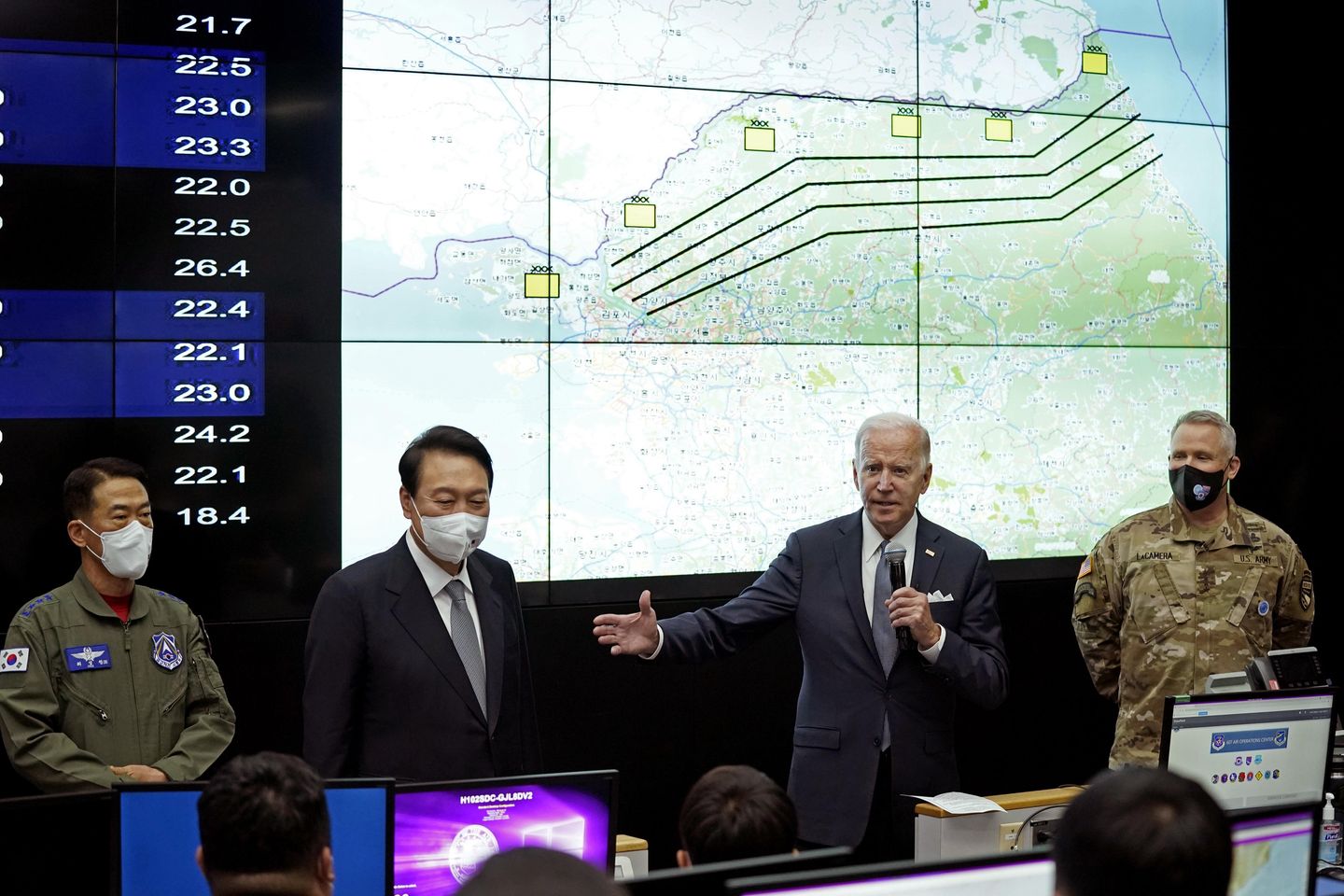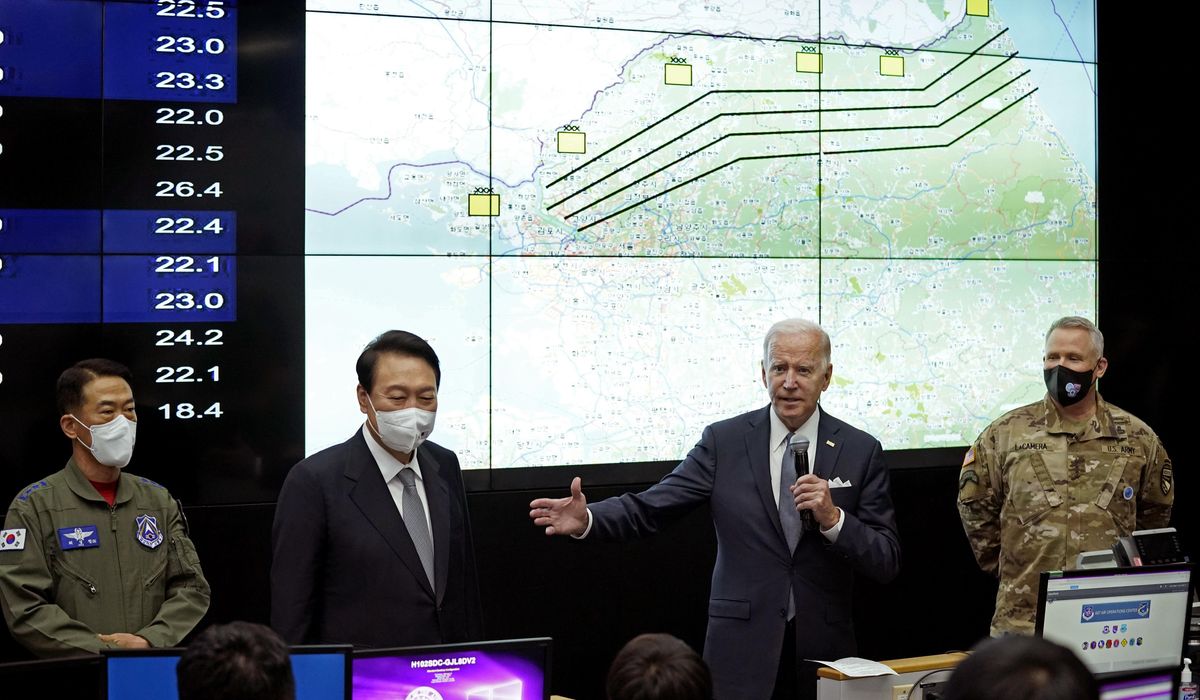

President Biden’s embrace of an Obama-era policy of “Strategic Patience 2.0” toward North Korea isn’t working, according to a leading Senate Republican voice on foreign policy, who argues that the administration needs to take a more active stance on the ballistic missile and nuclear weapons threats emanating from Pyongyang.
“I don’t believe the Biden administration has prioritized the threat of a nuclear North Korea,” Sen. Todd Young, Indiana Republican and a member of the Senate Foreign Relations Committee, told The Washington Brief, a monthly virtual forum hosted by The Washington Times Foundation.
In wide-ranging remarks to the forum Tuesday, Mr. Young stressed the need for Washington to confront the North Korean threat to help U.S. ally South Korea and to bolster the overall American strategy for countering communist China’s rise as a regional and global power.
“American leadership is essential at this period of time,” the senator said.
He said that “a stable peninsula increases the ability of the South Korean government to better deter against the Chinese Communist Party’s growing desire to dominate all of East Asia.”
Mr. Young, known for conservative values and a willingness to reach across the aisle on national security, praised Mr. Biden’s recent visit to South Korea and Japan. Still, he said the president has not developed a comprehensive, coherent strategy as U.S. intelligence warns that a North Korean nuclear test may be imminent.
SEE ALSO: Ukrainian President Zelenskyy: Stalemate with Russia is not an option
“U.S. policy in recent years has not been clear on what the goals of U.S. policy are or how we will attain them, and I believe this needs to change,” he said. “The American people rightfully demand not just competency, but also coherence in our foreign policy.”
Although the administration has focused on other foreign policy crises, including the withdrawal from Afghanistan and the Russian invasion of Ukraine, the lack of focus on the North Korea threat risks “showing other malign regimes around the globe that we are asleep at the wheel as they seek their own nuclear arsenal[s],” Mr. Young said.
The administration is showing signs that it hopes to increase military coordination with South Korea. Newly inaugurated South Korean President Yoon Suk Yeol has called for stronger alignment between Seoul and Washington in response to escalating North Korean nuclear and missile threats and China’s expanding pressure tactics against smaller countries in Asia.
The South Korean and U.S. militaries flew 20 fighter jets off South Korea’s western coast Tuesday in a show of force as a senior U.S. official warned of a forceful response if North Korea proceeds with its rumored first nuclear test explosion in nearly five years.
On Monday, the allies fired eight surface-to-surface missiles into South Korea’s eastern waters to match a Sunday missile display by North Korea. Pyongyang fired the same number of weapons from multiple locations in what was likely its biggest single-day testing event, according to The Associated Press.
Traveling to Seoul to discuss the standoff with South Korean and Japanese allies, Deputy Secretary of State Wendy R. Sherman warned of a “swift and forceful” response if North Korean leader Kim Jong-un carries out another nuclear test, the news agency reported Tuesday.
The Biden administration has vowed to push for additional international sanctions if North Korea proceeds with a nuclear test. Still, the prospects for meaningful punitive measures are unclear with the U.N. Security Council divided.
Analysts said North Korea tested an intercontinental ballistic missile on May 25 capable of reaching the U.S. mainland. The launches of shorter-range missiles on Sunday brought the total number of missile tests carried out this year by Mr. Kim’s regime to 18.
Mr. Young said the accelerated pace of North Korean missile testing should serve as a warning to the U.S. and its regional allies.
“Events from just this weekend, the 18th test of this year, must be a wake-up call for the administration about the threat facing us from the North,” the senator said. “Going forward, we need to balance a coherent strategy of engagement with one of restraint in this vital region of the world.”
President Trump criticized the Obama administration’s “strategic patience” approach to the North, but his personal diplomatic outreach to Mr. Kim in a series of meetings failed to produce a denuclearization deal. Analysts say Mr. Biden has returned to the Obama approach, signaling it is ready for talks with the North but is waiting for Pyongyang to make the first move.
Mr. Young appeared for The Washington Brief with regular participants Joseph DeTrani, a former CIA official and longtime diplomatic adviser on U.S. policy in Asia, and Alexandre Mansourov, a professor at Georgetown University’s Center for Security Studies. Former Rep. Dan Burton, Indiana Republican, also participated.
Instead of proposing talks, Mr. Kim has responded with a series of escalating missile tests.
When asked during the panel discussion whether he thought Mr. Biden’s policy toward North Korea, “Strategic Patience 2.0,” is working, Mr. Young responded, “No, it’s not working.”
“We should judge policies based on their outcomes,” he said. “I know there are a lot of distractions around the world which contribute to missile launches and other things, so there are exogenous factors. I recognize that the world’s a complicated place. But goodness gracious, 18? Eighteen launches so far this year? I think that’s demonstrative of the fact that this current policy is not working.”
Countering China
Mr. Young tied the North Korea crisis to the overall U.S. strategy for countering China. He said South Korea — with its modern economy, strong institutions and advanced military — has a “major role to play in this generational challenge.”
Mr. Young warned that North Korea’s security threat undermines Seoul’s ability “to stand up to China’s coercive activities in trade and business and in the maritime environment” while Beijing serves as Pyongyang’s main economic lifeline.
“Similarly to how discussions about America’s role in securing Taiwan must include Taiwan’s role in the global economy, so too must these realities be reflected in our commitments to South Korea,” the senator said.
South Korea-based tech giant Samsung “is a key player in the global supply of semiconductors,” he said.
“If they’re threatened, every U.S. industry will be implicated and affected, as we’re seeing today with the chip shortage,” he said.
Mr. Young lamented U.S. reliance on foreign manufacturers to supply semiconductors, which he described as the “feedstock” and “arguably more important than oil” to maintaining a modern economy.
“All of the advanced semiconductors, the chips, the microprocessors that are used in our missile systems, that are used for our most advanced technologies, all of them are developed overseas,” he said.
He emphasized the importance of a competitiveness bill slowly working its way through Congress. The legislation is designed to improve the ability of U.S. firms to fend off the Chinese challenge. A key pillar of the legislation involves the allocation of billions of dollars to incentivize chip manufacturing inside the United States.
Mr. Young said the legislation will achieve “essentially what the Chinese Communist Party is now doing” with its massive subsidization of advanced technology industry manufacturing.
“This is analogous to the way a governor tries to entice employers in other states,” he said. “If you’re not in the game, if you’re not offering some measure of incentives, you won’t have that domestic capacity. You won’t have a location on your soil.”
China, he said, has “a sense of urgency. They have a plan. It’s called China 2025. This is our plan: the U.S. Innovation and Competition Act.”
